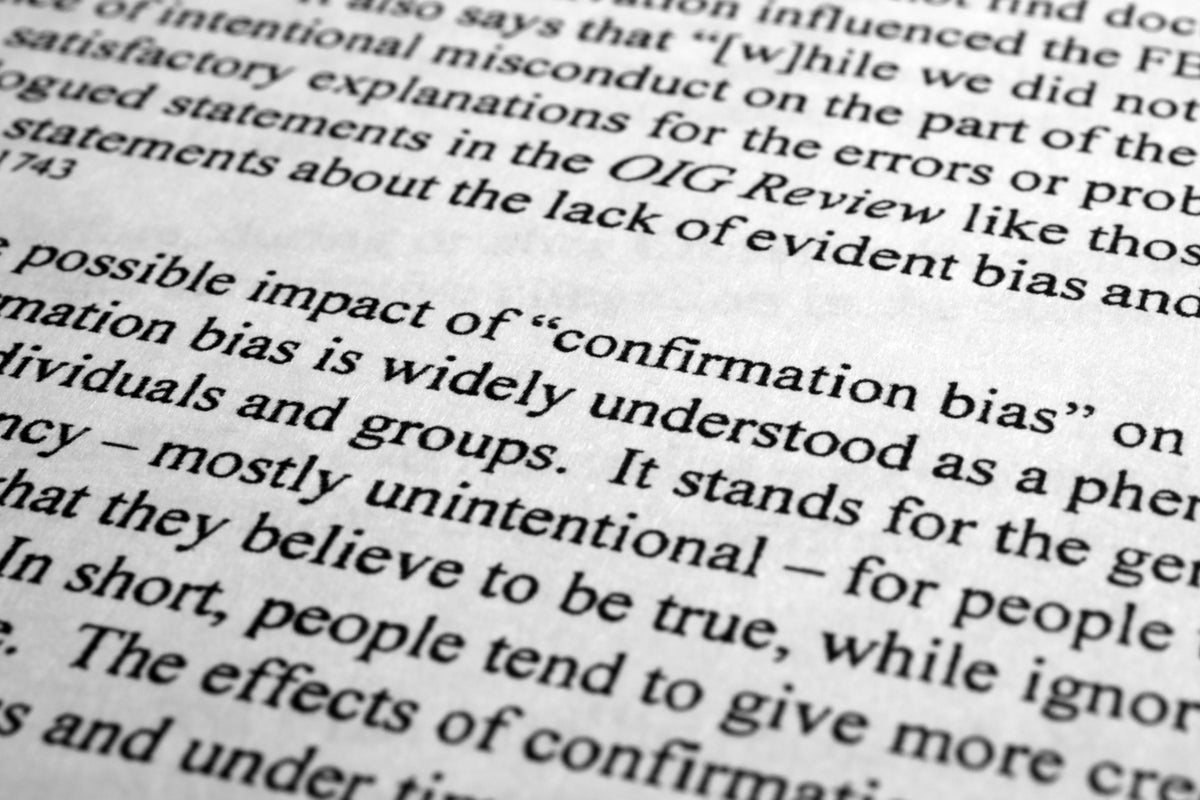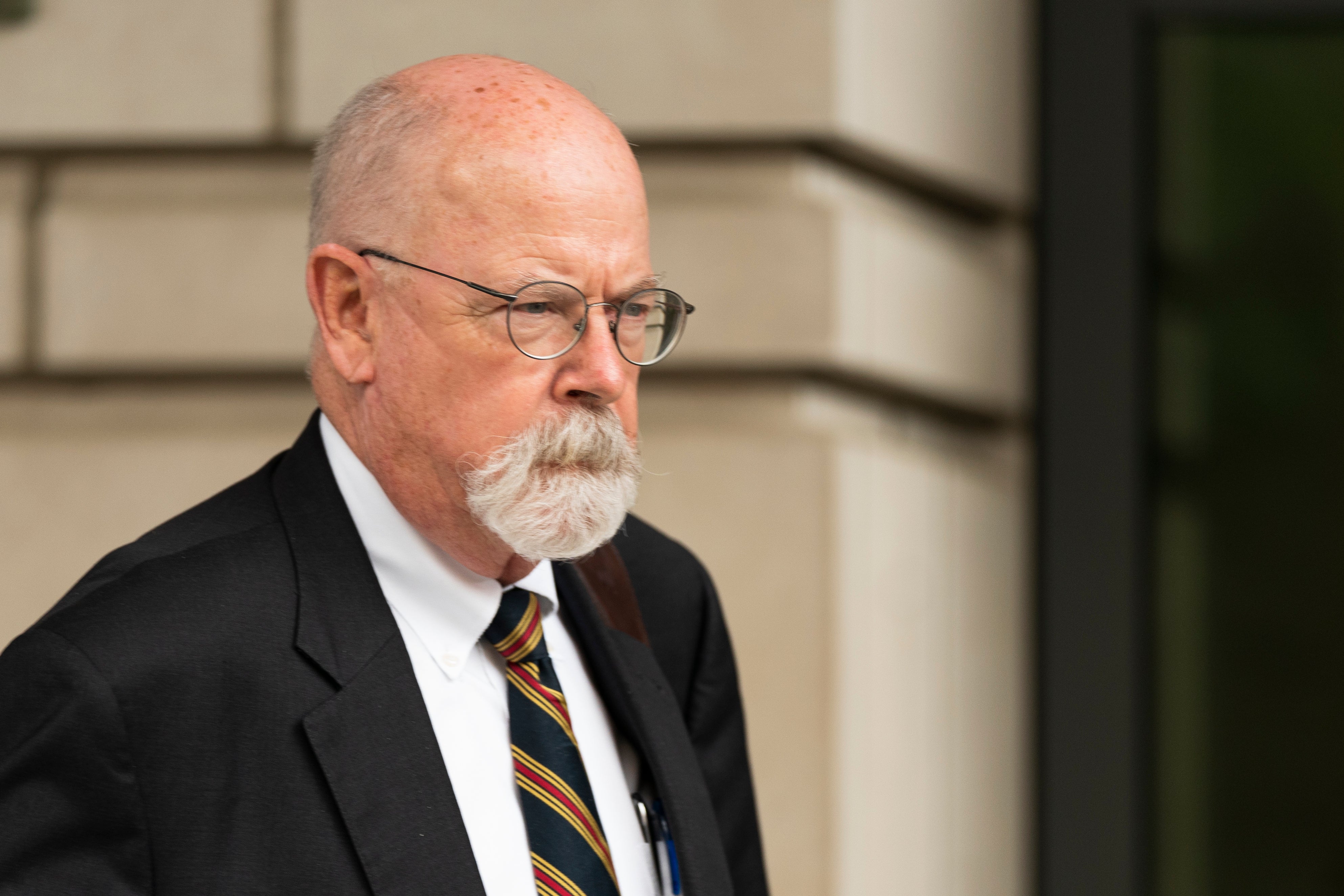
After a two-year investigation by a Trump administration prosecutor charged with undermining and discrediting the FBI’s probe into alleged ties between former president Donald Trump’s 2016 campaign and the Russian government has ended after four years and just a single criminal conviction, a report on the findings of that investigation found that the FBI was justified to open a preliminary probe into the matter.
The report by Special Counsel John Durham was the culmination of a four-year investigation into possible misconduct by U.S. government officials. In the nearly 300-page document, Mr Durham leveled withering criticism against the FBI but offered little new information and few significant revelations. Nonetheless, it will give fodder to Trump supporters who have long denounced the Russia investigation, as well as Trump opponents who say the Durham team's meager court record shows their probe was politically motivated.
Mr Durham, a Justice Department veteran who was hand-picked by then-attorney general William Barr to delegitimise the FBI’s efforts to determine whether Mr Trump’s campaign coordinated with Russia’s efforts to boost his candidacy — railed against the FBI for opening a probe into Mr Trump’s campaign based on “raw, unanalyzed and uncorroborated intelligence” and accusing investigators of suffering from “confirmation bias”.
His criticism of the FBI is centred around the bureau’s decision to launch a full counterintelligence probe into the campaign and Russia, rather than a preliminary one under which agents would have had more limited authority. While he admits that a preliminary investigation was justified, he took issue with the decision to launch a full counterintelligence probe into the alleged Trump-Russia ties based on a tip the bureau had received from an Australian diplomat, who had revealed that a Trump campaign aide, George Papadopoulos, had bragged that the Russian had acquired and were prepared to release damaging information about the campaign of former Secretary of State Hillary Clinton, Mr Trump’s Democratic opponent.
Mr Durham’s findings appear to directly contradict a prior investigation into the origins of the Trump-Russia probe by Michael Horowitz, the Department of Justice’s inspector general.
In that report, Mr Horowitz wrote that the FBI had sufficient cause to open an investigation into alleged ties between Mr Trump’s campaign and the Russian government based on the tip from the Australian diplomat.

To some extent, Mr Durham does not dispute that report’s conclusions, as he acknowledged that the bureau “had an affirmative obligation to closely examine” the allegations which arose from Mr Papadopoulos’ conversations with the Australian diplomat. But he writes that the FBI should have opened a “preliminary investigation” rather than the full counterintelligence probe launched to determine whether there were links between Mr Trump’s campaign and Russia’s efforts to interfere in the 2016 election.
Mr Durham also criticised the FBI for not conducting any “collaboration or joint assessments” of what they’d learned from the diplomat with “friendly foreign intelligence services or other US intelligence agencies”.
A look at the investigation and the report:
Who is John Durham?
Mr Durham spent decades as a Justice Department prosecutor, with past assignments including investigations into the FBI's cozy relationship with mobsters in Boston and the CIA's destruction of videotapes of its harsh interrogations of terrorism subjects.
In 2019, Mr Barr tasked him with investigating potential misconduct by U.S. government officials as they examined Russian election interference in 2016 and whether there was any illegal coordination between the Kremlin and Trump's presidential campaign. The allegations of misconduct stemmed largely from grievances raised by Mr Trump and his allies, who charged that the FBI was conducting a politically motivated “witch hunt” against the then-president.
Over the four years Mr Durham worked to discredit the department’s investigation, he only brought a handful of cases against criminal defendants, including an FBI lawyer who pleaded guilty to doctoring an email used to secure a surveillance warrant against an ex-Trump campaign adviser, and two other figures associated with the Trump-Russia probe who were acquitted at trial.
Despite skimpy results — one guilty plea and two acquittals — that failed to live up to Trump's expectations, Durham was able to continue his work well into the Biden administration, thanks in part to William Barr appointing Durham as a Justice Department special counsel shortly before Barr's 2020 resignation as attorney general.
Why did the Trump Justice Department appoint him to probe the Trump-Russia investigation?
Mr Durham was given the task of investigating the FBI just weeks after a different special counsel, Robert Mueller, wrapped up his investigation of possible connections between Russia and the Trump campaign. That probe produced more than two dozen criminal cases, including against a half-dozen Trump associates.
Mr Mueller — a former director of the FBI — conducted a year-long probe into the allegations that Mr Trump’s campaign had coordinated with Russian intelligence operatives, but was unable to find that Trump campaign officials had conspired with anyone connected with the Russian government.
He did, however, find hundreds of contacts between the Trump campaign and Russian officials during the 2016 campaign season, and concluded that Russian intelligence operatives had been directed to help Mr Trump win the presidency, in part by hacking and leaking emails from the Democratic National Committee and Clinton campaign officials through WikiLeaks.
Though his investigation did not result in charges against any Trump aide for working with Russia to tip the election, it did find that Russia interfered on Trump's behalf and that the campaign welcomed, rather than discouraged, the help.
But Mr Barr, who came to Mr Trump’s attention by criticising the probe, was deeply skeptical of the investigation's foundation and alleged to Congress that “spying did occur” against Mr Trump’s campaign.
To that end, he gave Mr Durham the authority to hunt for potential misconduct at the government agencies who were involved in collecting intelligence and conducting the investigation, even flying with him to Italy to meet with officials there as part of the probe.
Were there problems with the Russia investigation?
Yes, and a Justice Department inspector general inquiry already identified many.
The watchdog report found that FBI applications for warrants to eavesdrop on a former Trump campaign aide, Carter Page, contained significant errors and omitted information that would likely have weakened or undermined the premise of the application.
The cumulative effect of those errors, the report said, was to make it “appear that the information supporting probable cause was stronger than was actually the case.”
Still, the inspector general did not find evidence that investigators acted with political bias and said there was a legitimate basis to open a full investigation into potential collusion, though Mr Durham has disagreed.
What criminal cases did he bring and what was the outcome?
Mr Durham brought three prosecutions during his tenure, but only one resulted in a conviction — and that was for a case referred to him by the Justice Department inspector general. None of the three undid core findings by Mueller that Russia had interfered with the 2016 election in sweeping fashion and that the Trump campaign had welcomed, rather than discouraged, the help.
A former FBI lawyer, Kevin Clinesmith, pleaded guilty in 2020 to altering an email related to the surveillance of ex-Trump campaign aide. He was given probation.
But two other cases, both involving alleged false statements to the FBI, resulted in acquittals by jury.
Michael Sussmann, a lawyer for the Hillary Clinton campaign, was found not guilty of lying to the FBI during a meeting in which he presented computer data information that he wanted the FBI to investigate. A different jury acquitted Igor Danchenko, a Russian-American analyst, of charges that he lied to the FBI about his role in the creation of a discredited dossier about Trump.
What did Mr Durham find?
In his report, Mr Durham said that the FBI acted too hastily and relied on raw and unconfirmed intelligence when it opened the Trump-Russia investigation.
He said at the time the probe was opened, the FBI had no information about any actual contact between Trump associates and Russian intelligence officials.
He also claimed that FBI investigators fell prone to “confirmation bias,” repeatedly ignoring or rationalizing away information that could have undercut the premise of their investigation, and he noted that the FBI failed to corroborate a single substantive allegation from a dossier of research that it relied on during the course of the probe.
“An objective and honest assessment of these strands of information should have caused the FBI to question not only the predication for Crossfire Hurricane, but also to reflect on whether the FBI was being manipulated for political or other purposes,” the report said, using the FBI's code name for the Trump-Russia probe. “Unfortunately, it did not.”
How did the FBI respond?
In a statement, the FBI pointed out that it had long ago made dozens of corrective actions. Had those measures been in place in 2016, it says, the errors at the center of the report could have been prevented.
It also took pains to note that the conduct in the report took place before the current director, Christopher Wray, took the job in the fall of 2017.
What happens next?
It didn't take long for Republicans in Congress to react. Rep. Jim Jordan, who chairs the House Judiciary Committee, said he had invited Mr Durham to testify on Capitol Hill next week.
Trump, too, sought to seize on the report, claiming anew in a post on his Truth Social platform that the Durham report had found “the crime of the century” and calling the Russia investigation the “Democrat Hoax.”
Though the FBI says it's already taken some steps, Durham did say it's possible more reform could be needed. One idea, he said, would be to provide additional scrutiny of politically sensitive investigations by identifying an official who would be responsible for challenging the steps taken in a probe.
He said his team had considered but did not ultimately recommend steps that would curtail the FBI's investigative authorities, including its use of tools under the Foreign Intelligence Surveillance Act to eavesdrop on suspected spies or terrorists.







